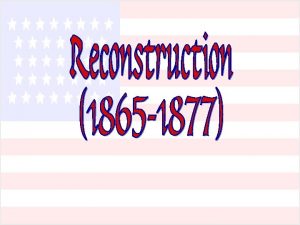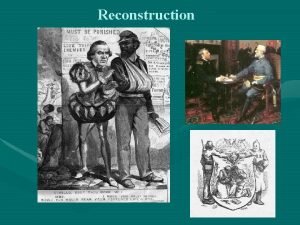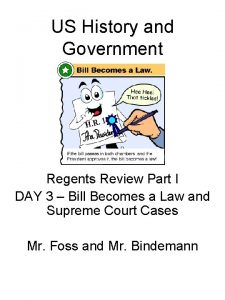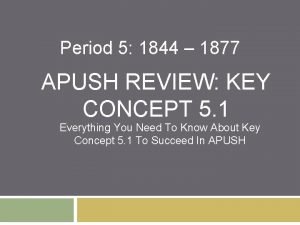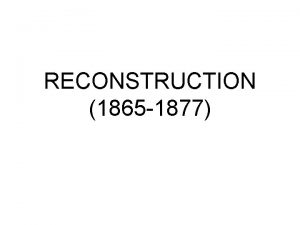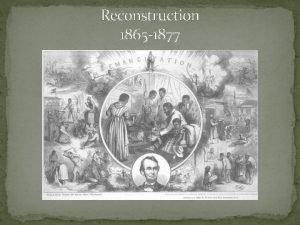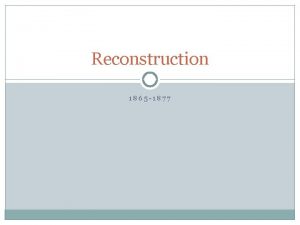American History I Reconstruction 1865 1877 NCFE Review








- Slides: 8

American History I Reconstruction 1865 -1877 NCFE Review

The Reconstruction Amendments After the Civil War, Radical Republicans who wanted African Americans to have equal rights, passed three amendments. 13 th Amendment abolished slavery. 14 th Amendment made former slaves citizens and provided equal protection of the law for all citizens. 15 th Amendment provided voting rights for African American males.

Plans for Reconstruction The first question that had to be answered during Reconstruction was - how would the southern states be readmitted to the Union? Lincoln’s Plan for Reconstruction was the 10% Plan when 10% of a state’s voters to a loyalty oath, they could organize a new state government that banned slavery o Congress tried to counter with the Wade-Davis Bill that required 51% of voters to pledge loyalty to rejoin the union, however, the bill never passed. Johnson’s Plan included a loyalty oath but added one condition that Southerners with property over $20, 000 had to apply for a personal pardon from the President. o Johnson wanted to punish the South. o Congressional leaders opposed the plan because it did not help former slaves.

Radical Reconstruction Radical Republicans wanted African Americans to have equal rights. o Radical Republicans plan for Reconstruction was to divide the south into 5 military districts to control the South, however, this plan lost support because it was very expensive.

African Americans during Reconstruction The majority of freedman are going to enter into sharecropping or tenant farming arrangements, where they would rent the land or share the crops on their assigned plot, with their former masters. o Sharecropping and tenant farming leads to a cycle of debt for African American farmers. Black Codes were passed by the Southern legislatures following the Civil War to place limits on the opportunities given to African Americans and keep them in a “slave like” inferior state to whites.

African Americans during Reconstruction The Freedman's Bureau was created to give educational opportunities and aid to African Americans after the Civil War. o They opened more than 4, 000 schools in the South during Reconstruction. Many African Americans also fled to the North and the West to get out of the South, called Exodusters.

The Election of 1876 and the Compromise of 1877 In the Election of 1876 Democrat Samuel J. Tilden had more popular votes than Republican Rutherford B. Hayes. o Tilden won 184 out of the 185 electoral votes needed to win, there were 20 more disputed votes in four states. In the Compromise of 1877 Democrats agreed that Hayes would take office if the Radical Republicans would remove federal troops from the South. o Republicans gave up on the Civil Rights laws that they wanted to enact in the south to further equality for African Americans. o The Compromise of 1877 ended Reconstruction.

The Rise of Jim Crow The Slaughterhouse Cases weakened the Civil Rights amendments and acts passed during Reconstruction because it left it up to the states to enforce those laws. Plessy v. Ferguson legalized the separation of African Americans and whites stating that if the accommodations were equal they could be separate. o Led to the establishment of separate school systems for African Americans. Southern governments, in addition to black codes, began passing laws that would limit the abilities of African Americans to vote through literacy tests, poll taxes, and the grandfather clause.
